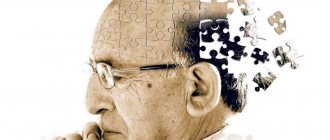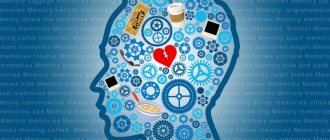Most people are designed in such a way that they cannot do two or more different things at the same time. We can only focus on one thing at a time. But sometimes we don’t even have enough strength to fully concentrate on the task at hand. To prevent such absent-mindedness, it is worth practicing the development of concentration. Many years of studying the functioning of the brain have made it possible to develop many ways to strengthen memory and attention. Thanks to this, each person can choose an exercise that will allow them to improve and develop. Below we suggest that you familiarize yourself with the most effective ways to develop your own ability to concentrate.
Reasons for deterioration in concentration
Decreased attention and absent-mindedness causes a lack of oxygen reaching the brain.
The cause may also be simple fatigue or overload with new information. These are fairly common reasons that are easy to get rid of. It's enough to just have a good rest. But there is another situation, which is expressed by a loss of concentration. Asthenic syndrome, or dysfunction of the brain, is the result of a negligent attitude towards one’s own health. The reasons for the appearance of this unpleasant process are due to several reasons.
- Frequent stress and anxiety cause exhaustion of the nervous system.
- Insufficient intake of vitamin B12 into the body.
- Problems with the endocrine system negatively affect brain function.
- Decrease and weakening of immunity.
- Death of brain cells after injury or as a result of Alzheimer's disease.
Disorder or personality trait?
The concept of neurodiversity, an approach that views different neurological features as a result of normal variations in the human genome, is now gaining popularity. Adherents of neurodiversity are interested in both sexual orientation and gender self-identification, as well as some genetically determined mental illnesses, including autism, bipolar disorder and attention deficit disorder. Some scientists believe that many of the behaviors that lead to a diagnosis of ADHD are natural personality traits and do not indicate unhealthy abnormalities. But because such traits make it difficult for a person to function in modern society, they are labeled as “disorders.”
Psychotherapist Tom Hartman developed the spectacular “hunter and farmer” theory, which posits that people with ADHD retain the genes of primitive people responsible for behavior optimal for hunters. Over time, humanity switched to agriculture, which required more patience, and “hunting” qualities - quick reactions, impulsiveness, receptivity - began to be considered undesirable. According to this hypothesis, the problem lies only in setting tasks, and the ability of people with the syndrome to “hyperfocus” - strong concentration on a task that is subjectively interesting to them to the detriment of all others - can also be considered as an evolutionary advantage. True, Hartman is difficult to consider as an objective researcher - his son was diagnosed with ADHD.
But in any case, there is a sound grain in this theory: since one of the most important criteria of mental health is the ability to successfully cope with everyday tasks, many problems can be mitigated by choosing a suitable field of activity. That is, one where routine processes and patience play a lesser role and a “sprinting” temperament, the ability to improvise, curiosity and the ability to easily switch between various activities are valued. For example, it is believed that with ADHD you can make a good career in sales or entertainment, in the arts, and in “adrenaline” professions (say, a firefighter, a doctor, or the military). You can also become an entrepreneur.
How to improve memory and attention
Proper focus on a specific thought, goal or subject depends on three important factors:
- Comfortable environment. Absence of external and internal irritants, convenience, necessary furnishings.
- Nutrition and healthy lifestyle. Mandatory walks in the fresh air, enough water and food rich in vitamins.
- Way of thinking. The ability to focus on one thing, highlighting priority tasks.
These three points ensure the reliable operation of think tanks. But even with all the necessary conditions, sometimes there is absent-mindedness and forgetfulness. Then we should think about how to improve memory and force the brain to concentrate on the object we need unquestioningly.
Ways to increase concentration and attention
An adult needs to constantly remain collected and have a sufficient level of focus on the goal. There are many different options for increasing concentration. Each of them is aimed at using brain resources at 100%. By following the necessary instructions regularly, you can significantly increase your inner potential.
Planning
Train yourself to make action plans before starting any new endeavor.
By following the points of the plan, you will not only learn to concentrate on the task. This will help monitor progress towards the goal, which has a positive effect on the level of self-control. Thanks to carefully thought out steps, you will be able to avoid being scattered on unnecessary things. In addition, by clearly visualizing the desired result, you will concentrate more accurately on the task. A practical approach will increase your focus with each item completed.
In addition to the necessary actions, do not forget about the time frame. This will help you mobilize your own strength to meet the scheduled time. You are guaranteed to be organized and collected if you force yourself to follow the plan without deviations or concessions.
Set goals
Start your morning with a clear vision of your goals for the day.
These can be the most ordinary tasks that you perform without thinking. However, the habit of going towards the intended result will have a positive effect on the implementation of more ambitious plans. Thanks to cultivating the right direction towards goals, it is easy to increase concentration. You won’t even notice how after some time you will be able to quickly and clearly solve problems that previously seemed unimaginably difficult.
Meditation
A simple and effective way to ensure proper brain function is meditation.
Calmness, correct posture and breathing control successfully help you relax and concentrate at the same time. It is important that during this time you are not disturbed by any extraneous sounds or smells. At the initial stages, you will not be able to abstract yourself from them. 20 minutes of meditation a day is enough to improve attention in an adult. Also, controlling your own breathing helps you learn to concentrate on only one task and ignore all the others. This is the key to successful brain function.
Proper sleep
To be able to fully rest, you should provide yourself with comfortable sleeping conditions.
First of all, take care of a comfortable “rookery”. It is worth throwing away old, lumpy and sagging mattresses with protruding springs. The ideal option is a modern orthopedic base that conveniently adapts to the parameters of your body. Don’t forget that you need to prepare for bed correctly.
- Avoid using gadgets, watching movies and playing computer games at least an hour before bedtime.
- Don't overeat. The digestive system should have time to rest overnight. In addition, a slight feeling of hunger will give you calm dreams that do not disturb the nervous system.
- Ventilate the room. Even in frosty weather, be sure to open the window for 10-15 minutes. Fresh air has a beneficial effect on healthy sleep.
- Train yourself to go to bed and get up at the same time. In this way, the body will learn to fully rest in the allotted time, and you won’t have to wonder: how to increase mental clarity?
Proper nutrition
By choosing healthy and nutritious foods, you increase the overall health and capabilities of the body. But for the brain, the main fuel is glucose. It is important to monitor your blood sugar levels and not allow them to deviate too much from the norm. To maintain performance and increase concentration, be sure to include the following foods in your diet:
- Fatty fish: tuna, mackerel, salmon, sardines.
- Cocoa and dark chocolate.
- Baked goods made from wholemeal flour.
- Broccoli and cauliflower.
- Eggs.
- Flax and pumpkin seeds.
Brain exercises
If you're wondering how to improve your concentration when you have little free time, here are a few helpful exercises to consider.
- Use washing dishes as a way to force your brain to focus on the task. When washing an item, record and mentally describe your actions. This way you will learn to completely immerse yourself in the work process without extraneous thoughts.
- While doing work or reading a book, keep a piece of paper and a pen next to you. Every time your thoughts stray from the task at hand, make a mark on the sheet. This will help control your concentration level. After some time of such actions, you will notice that there are fewer and fewer marks. This is called mindfulness of concentration.
- While walking, focus on what is happening next to you, be it an object or phenomenon. Speak out all the moments mentally. For example, “A shaggy dog in a black collar ran by. The owner is following him.” or “I walked past a car and it had a flat tire.”
Genetics and heredity
Scientists have noted that a person’s ability to concentrate without much effort can be transmitted at the genetic level.
By examining your particular set of genes, you can determine how difficult it will be for you to force your brain to focus. Thanks to modern equipment, carrying out such an analysis is not difficult. Thus, thanks to genetic research, you can determine your level of resistance to distractions. Thanks to this, you can build a plan for training your brain centers to increase your productivity.
Organization of the work process: refusal of multitasking
Don't try to grab everything that is available to you at once.
When you multitask, you run the risk of failing everything. Only in very rare cases and under extremely fortunate circumstances is it possible to cope with all the work being done simultaneously. Learn to productively plan the process of completing tasks. Teaching yourself to be focused and consistent is very useful. Prioritize importance and urgency. You should not start a new business without first completing the previous one.
The right workplace
Your personal desk or office at work is a place where nothing should distract you from completing your tasks.
You should not clutter your work surface with foreign objects that are not related to your specialization. This will make it easier for you to focus and significantly increase your productivity. Having a permanent workspace at home is a very good approach to developing concentration. You need to organize an area where you will do your work or study. Each item in this area should have a certain functionality. At the same time, remember that it is absolutely forbidden to work anywhere else in the house.
Get rid of irritants
Avoid excessively loud or rhythmic music while working. If you cannot practice in silence, choose smooth melodies without vocal accompaniment. At home, warn your family that you will be busy for a certain time and there is no need to distract you. In the office, while doing an important task, try to turn off the ringer on your phone.
Take breaks
If progress towards your goal requires a lot of time, do not forget to take rest breaks. This could be a short walk or a coffee break. After sitting at your desk, stretch and do a few simple exercises to improve your blood circulation. Otherwise, you risk overstrain and weakening of brain activity.
What life is like for someone with ADHD
Attention deficit disorder causes difficulties for patients even at school: a teenager with this diagnosis, even if he has a high IQ, finds it difficult to learn material and communicate with peers and teachers. A person with ADHD can immerse himself in a topic that is subjectively interesting to him (however, as a rule, not for long - such people are prone to frequent changes of priorities and hobbies) and show brilliant abilities, but it is difficult for him to perform even simple routine work. At the same time, he is poor at planning, and with a high level of impulsiveness, at foreseeing even the immediate consequences of his actions. If all this is also combined with hyperactivity, such a teenager turns into a school teacher’s nightmare - he will get bad grades in “boring” subjects, surprise others with impulsive antics, disrupt order and sometimes ignore social conventions (since it will be difficult for him to focus on expectations and requirements of others).
Previously, it was believed that the disorder would “dissolve” on its own with age, but according to recent data, approximately 60% of children suffering from ADHD continue to exhibit symptoms of the disease into adulthood. An employee who is unable to sit through the end of a meeting and ignores important instructions, a talented specialist who misses important deadlines by suddenly getting distracted by some personal project, an “irresponsible” partner who is unable to organize his home life or suddenly blows a lot of money on some strange whim. - all of them may not just be weak-willed slobs, but people suffering from a mental disorder.










